A majority of Americans carry some form of debt. People borrow money to help buy homes, pay for school, cover expenses during an emergency and more. If you’re carrying more than one debt you’re not alone.
So how do you know which one to pay off first?
When deciding which debt to target, you’ll want to carefully consider your unique financial circumstances. Review your debts and keep a close eye on any that are past due or subject to high interest rates. Regardless of which you choose, be sure that you make the minimum payments on the others to avoid missed payments.
How Do I Know Which Debt To Pay Off First?
The best debt to pay off first depends on your unique financial circumstances. Some debts you may want to consider targeting include the following:
- The debt with the highest interest rate.
- The debt that is most overdue or closest to default.
- The debt with the smallest outstanding balance.
A good way to decide is to first make a list of all your debts. Include their interest rates, minimum monthly payments and balances. You should also note if any of the debts are past due or in collections.
With your debt listed out, you can easily see which debts are impacting you the most. Pay close attention to ones that present the risk of credit damage or additional interest — you may want to prioritize paying them off. Some borrowers may want to target debts with smaller outstanding balances. Paying these off first can offer a quick win and might provide the psychological boost you need to tackle the others.
When deciding which debt to pay off first, choose the one that offers the greatest benefit for your unique financial circumstances.
What Type of Debt Should Be the Highest Priority To Pay Off?
There are two main types of debt: revolving and installment. Revolving debt typically uses compound interest, which means you get charged interest on the interest you’ve accrued. Because of this, revolving debt may be costing you more than installment debt, and you may want to consider prioritizing it.
In addition, excessive amounts of revolving debt are considered a red flag by FICO. Reducing revolving debt can help lower your credit utilization ratio, and a low credit utilization rate can have a positive impact on your FICO credit score.
What’s the Best Way To Pay Off Debt?
There are a few different debt repayment strategies you can use, and they all have their pros and cons. They can be used on any kind of debt: student loans, credit card debt, an auto loan or a personal loan. Feel free to try one and use another if it doesn’t work for you. The important thing is to find something that meets your unique needs and stick with it.
Debt avalanche. This is one of the most popular debt repayment plans. When using the debt avalanche method, you’ll focus on paying off the debt with the highest interest rate first. After that debt is paid, you’ll take the amount you were paying on that and apply it to payments on the debt with the next highest interest rate. It can save you a significant amount of money in interest and help you pay off your debt fast.
- Pros
- It will save you the most money in interest.
- The process builds momentum as you pay off debts which is encouraging and can be a fast way to get debt free.
- It provides a structured plan meaning you’ll always know which debt to pay off next.
- Cons
- Sometimes, the debt with the highest interest rate is the debt with the highest balance. This can be discouraging and feel like too much to tackle at first.
- It requires that you have sufficient room in your budget to make more than the minimum payment.
Debt snowball. The debt snowball method is another popular debt repayment method. It’s similar to the debt avalanche method, but instead of focusing on the debt with the highest interest rate first, you’ll focus on the debt with the lowest balance. Once the first debt is paid off, you’ll move to debt with the next smallest balance. It can be a good strategy to help clear out some debts with lower outstanding balances.
- Pros
- It can be a motivating strategy. Seeing the small debts get cleared can give you a psychological boost.
- It can help lower your credit utilization rate and free up some more room in your budget.
- It’s easy to implement and provides a structured debt repayment plan.
- Cons
- You may end up paying more in interest than if you use the debt avalanche method.
- It may take longer to become debt free than the debt avalanche method.
- It requires that you have room in your budget to make more than the minimum payment.
Debt consolidation. Consolidating your debt is another option — though it can increase the amount of interest and lengthen the amount of time it takes to get debt free. With debt consolidation, you take out a loan or a balance transfer credit card to pay off your other debts. This means you’re essentially starting over, but with one big debt instead of a bunch of smaller ones.
- Pros
- If you’re struggling to keep up, it may help you reduce your monthly payments.
- Some balance transfer credit cards won’t charge interest for the first year or so.
- It simplifies your finances.
- Cons
- It can increase the amount you pay in the long run.
- It won’t fix financial problems on its own. (If you pay off a credit card and then start using the card again, you’ll just be in more debt.)
Why Is It Important To Pay Off Debt?
Debt payoff has a big impact on your personal finances. Here are some of the reasons it’s important to pay off your debt.
It can help you improve your credit score. When you’ve paid off your loans and your credit card balances you’re reducing your debt to income ratio and your credit utilization rate. Both of these things can help you rebuild your credit score.
It can reduce your interest expenses. Lenders, credit card issuers and other financial institutions look at your credit report or FICO Score when making decisions about extending credit. With a better credit score, you can get lower interest rates, larger credit limits and better terms over all.
It can help you be a better budgeter and saver. When you’re not making payments toward debt, more of your money stays in your pocket. This means you can put more money toward accomplishing your savings goals like starting an emergency fund or buying a new car.
It’s psychologically freeing. Sixty percent of Americans feel stressed just thinking about their finances. When you pay off debt, it can feel like a weight has been lifted off your shoulders. This can help improve your mental health and lower your stress levels.




